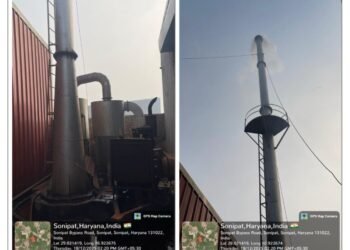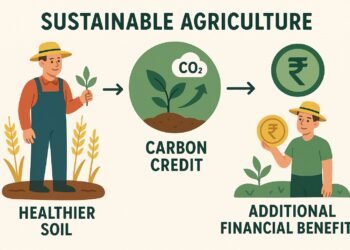Latest IRP report lists 12 ways to use natural resources more efficiently, improve human health and reduce the environmental damage caused by food systems
India CSR News Network
NAIROBI: A major overhaul of the global food system is urgently needed if the world is to combat hunger, use natural resources more efficiently and stem environmental damage, the International Resource Panel (IRP) says.
 In its latest report, the IRP – a consortium of 34 internationally renowned scientists, over 30 national governments and other groups hosted by the United Nations Environment Programme (UNEP) – calls for a switch to a “resource-smart” food system that changes the way food is grown, harvested, processed, traded, transported, stored, sold and consumed.Current food systems, which the IRP says are “inefficient” and “unsustainable”, are responsible for 60 per cent of global terrestrial biodiversity loss and about 24 per cent of global greenhouse gas emissions.
In its latest report, the IRP – a consortium of 34 internationally renowned scientists, over 30 national governments and other groups hosted by the United Nations Environment Programme (UNEP) – calls for a switch to a “resource-smart” food system that changes the way food is grown, harvested, processed, traded, transported, stored, sold and consumed.Current food systems, which the IRP says are “inefficient” and “unsustainable”, are responsible for 60 per cent of global terrestrial biodiversity loss and about 24 per cent of global greenhouse gas emissions.
They are also responsible for the overfishing of 29 per cent of commercial fish populations and the overexploitation of 20 per cent of the world’s aquifers.Although food production has increased across the world, more than 800 million people remain hungry, more than two billion suffer from micronutrient deficiencies – mainly vitamin A, iodine, iron and zinc – and more than two billion people are overweight or obese, the report notes.
Compounding the problem, pressure on natural resources is expected to rise as populations grow and demand for food increases.To combat these problems, the IRP says a “resource-smart” food system should be adopted, a system that adheres to three principles: low environmental impacts, the sustainable use of renewable resources and the efficient use of all resources.
UNEP Executive Director Achim Steiner said, “We have the knowledge and the tools at our disposal to feed all the people in the world while minimizing harm to the environment. A better, more sustainable food system can allow us to produce and consume food without the detrimental effects on our natural resources. The environment is not the only beneficiary of this system. More sustainable consumption and production of food will also be a boon to human health and the goal to end hunger throughout the world. ”To help the world shifts to a more sustainable food system, the IRP has come up with a list of 12 key recommendations for governments, private companies, civil society and citizens. Among them are:
- Reduce food loss and waste
- Move away from resource-intensive products such as meat, ‘empty calories’ and highly processed food.
- Connect rural and urban centres, especially in developing regions, where urban actors (e.g. supermarkets) could invest in regional supply chains and improve the position of smallholders.
- Connect urban consumers with how their food is produced and how it reaches their plates, and inform them about both the health and environmental consequences of dietary choices.
- Protect peri-urban zones around cities and use them for local food production. Decouple food production from resource use and environmental impacts, and replace certain inputs (such as pesticides) with ecosystem services.
The IRP report also recommends removing harmful subsidies, such as fossil fuel subsidies, that encourage unsustainable production and practices.
Compounding current problems, rising wealth in developing countries will lead people to adopt diets that are richer in resource-intensive products – meat, fish, fruits, vegetables and highly processed foods – at a time when climate change will make producing food increasingly difficult.
As per-capita income rises, people’s diets change from one that is largely rich in carbohydrates to a diet richer in calories, sugars, and lipids, with more livestock-based products. In combination with an increasingly sedentary lifestyle, this has led to a sharp increase in obesity, the report states.
It blames the high consumption of animal-based products and highly processed foods for triggering “disproportionate environmental costs” while undermining public health due to obesity related disease.Globally, chicken meat and dairy consumption are expected to increase by 20 per cent over the next 10 years while the consumption of pig meat and beef is also projected to increase, both by around 14 per cent, according to data reviewed in the IRP report.
A combination of the various options listed in the IRP report, at different points of intervention and by diverse actors throughout the system, could lead to resource efficiency gains of up to 30 per cent for certain resources and impacts.Some of these options include:
- ‘Sustainable intensification’ of crop production – higher yields without increasing environmental impacts
- Better feed conversion and higher productivity of pastoral systems· Higher nutrient efficiency along the food chain – better recycling of minerals in animal manure and use of by-products or food waste as feed or compost
- More efficient aquaculture systems – lower nutrient losses and less impact on coastal systems
- Reduction of over consumption and change of unhealthy dietary patterns – shift in affluent societies from animal-based to more plant-based diets
“If the above changes are not made, land degradation, the depletion of aquifers and fish stocks and contamination of the environment will lower future food production capacity,” the report warns. “It will undermine the food systems upon which our food security depends, as well as cause further degradation of other ecosystem functions.
Preview copies of the report can be downloaded from: www.unep.org/resourcepanel




















